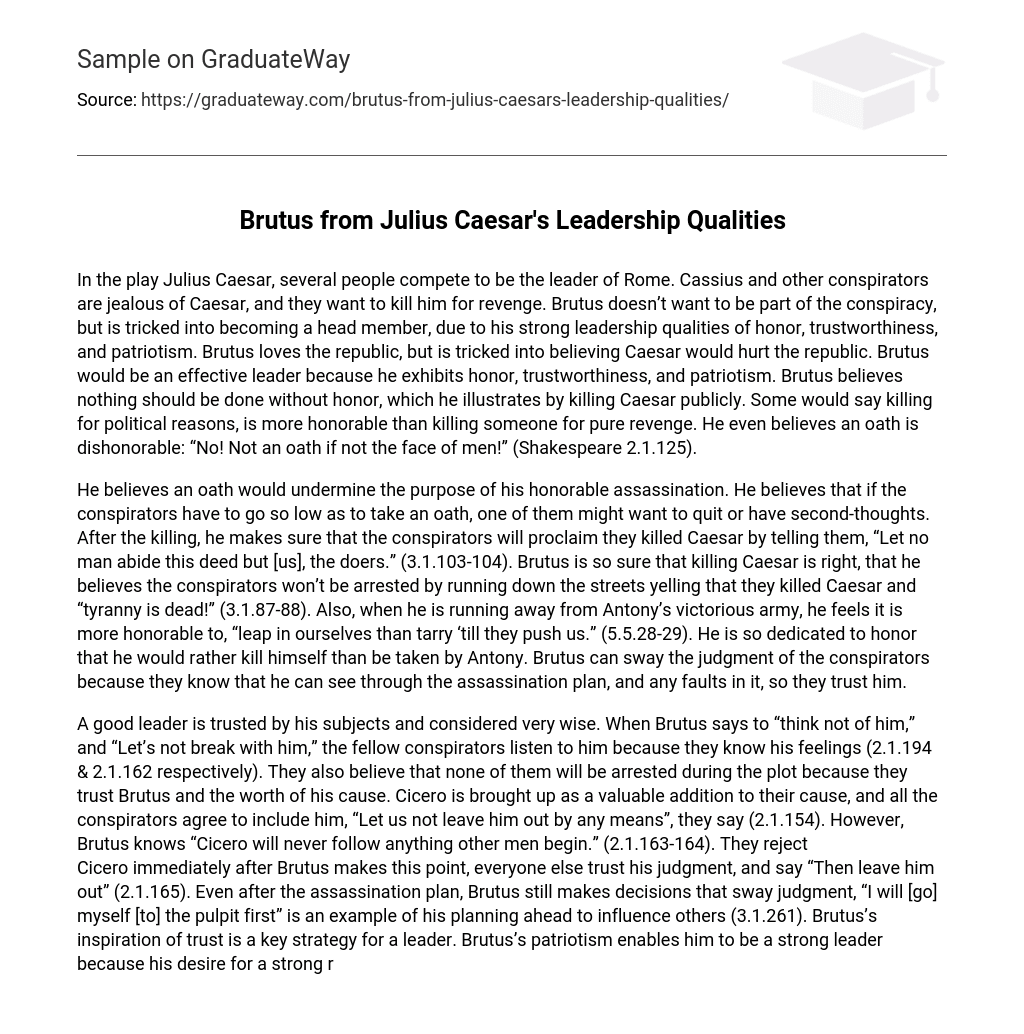In the play Julius Caesar, there is a competition among several individuals to become the leader of Rome. Cassius and other conspirators harbor jealousy towards Caesar and seek revenge by plotting to kill him. Although initially hesitant, Brutus is ultimately deceived into becoming a major participant in the conspiracy due to his exceptional leadership qualities of honor, trustworthiness, and patriotism. Despite his love for the republic, Brutus is misled into believing that Caesar would be detrimental to its welfare. Brutus demonstrates characteristics that make him a capable leader, such as honor, trustworthiness, and patriotism. He firmly believes that all actions must be carried out with honor, as shown when he publicly kills Caesar. Some argue that killing for political motives is more honorable than seeking revenge solely for personal reasons. Additionally, Brutus considers taking an oath to be dishonorable: “No! Not an oath if not the face of men!” (Shakespeare 2.1.125).
Brutus believes that taking an oath would undermine the purpose of his honorable assassination. He thinks that if the conspirators have to stoop so low as to make a promise, one of them might want to quit or have doubts. After killing Caesar, he ensures that the conspirators will publicly declare their responsibility by commanding them, “Let no man abide this deed but [us], the doers.” (3.1.103-104). Brutus is so confident that killing Caesar is justified that he believes the conspirators won’t be caught if they run through the streets shouting that they killed Caesar and “tyranny is dead!” (3.1.87-88). Also, when he is fleeing from Antony’s triumphant army, he feels it is more honorable to, “leap in ourselves than tarry ‘till they push us.” (5.5.28-29). He is so devoted to honor that he would prefer to kill himself than be captured by Antony. Brutus has the power to influence the judgment of the conspirators because they know he can see through the assassination plan and any flaws in it, thus they trust him.
A good leader is trusted by his subjects and considered very wise. When Brutus advises the fellow conspirators to “think not of him” and “Let’s not break with him,” they listen to him because they know his feelings (2.1.194 & 2.1.162 respectively). They also have faith that none of them will be arrested during the plot because they trust Brutus and the merit of his cause. Cicero is suggested as a valuable addition to their cause, and all the conspirators agree to include him, stating “Let us not leave him out by any means” (2.1.154). However, Brutus understands that “Cicero will never follow anything other men begin” (2.1.163-164). As soon as Brutus makes this point, everyone else trusts his judgment and immediately rejects Cicero, saying “Then leave him out” (2.1.165). Even after the assassination plan, Brutus continues to make decisions that influence others, exemplified by his statement “I will [go] myself [to] the pulpit first” (3.1.261). This showcases how trust inspires others, a key strategy for a leader. Brutus’s patriotism enables him to be a strong leader because his desire for a strong republic is based on his devotion to the Roman citizens and not selfishness, unlike Caesar.
The main example of Brutus’ patriotism is seen in his debate on whether to kill Caesar. He argues that if Caesar were to be crowned, it could potentially change his nature and the government. This shows that Brutus wants to prevent the government from becoming something other than a republic. Despite their friendship, Brutus prioritizes saving the government over personal relationships. To describe Caesar, Brutus compares him to a “serpent’s egg” which appears harmless for now but could later hatch and cause havoc in Rome. He further explains that Caesar has a hidden ability to anger and harm the government, similar to a hornet or scorpion with a stinger.
These comparisons of Caesar to dangerous animals describe the potential political danger that Caesar poses and also serve to ignite Brutus’s patriotic enthusiasm. Some may argue that Brutus is obstinate, but in reality, he merely disregards distractions and remains focused on his objective. Despite the opinions of others about Brutus, his actions exemplify those of a genuine leader. Although his actions ultimately culminate in murder, he prioritizes his principles and morals. The act of murder itself is inherently wrong, yet in his perspective, he commits it for the right motives. His demonstrations of honor, trustworthiness, and patriotism unequivocally demonstrate his leadership in this treacherous conspiracy.





